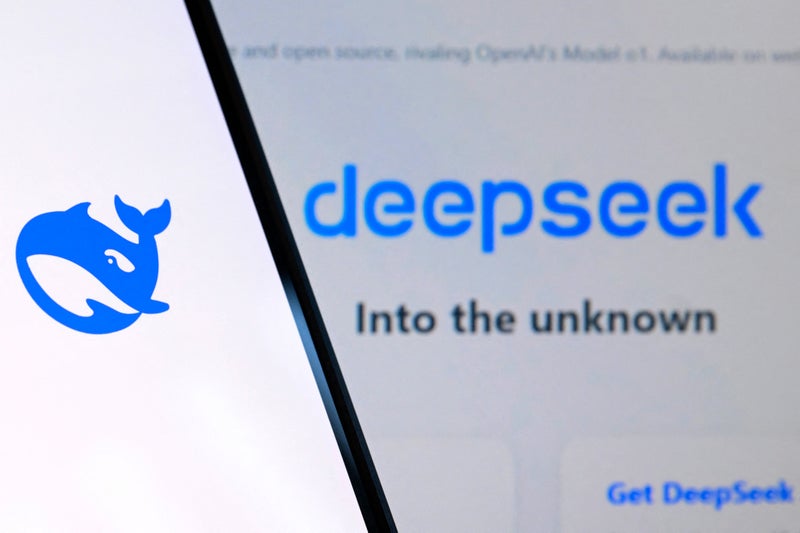The cheap Chinese chatbot has stunned tech giants – and opened up the possibility that other countries, not just China, could now afford to enter the AI race. At 2.16pm California time last Sunday, the US billionaire tech investor Marc Andreessen called it. “DeepSeek R1 is AI’s Sputnik moment,” he posted on X. A Chinese startup, operating since 2023 and helmed by a millennial mathematician, had unveiled a new chatbot that seemed to equal the performance of America’s leading models at a fraction of the cost.
Never mind that its answers on everything from the status of Taiwan to the 1989 Tiananmen Square massacre were curbed by Chinese Communist party (CCP) censors. To Andreessen, a veteran of decades of technology booms and busts, it was like the Soviet Union getting the first satellite into orbit in 1957 and shocking America. The next day, shares in several of the world’s biggest companies plunged – including the biggest fall in US market history for microchip maker Nvidia, which lost nearly $600bn. Investors believed DeepSeek’s achievement meant China would no longer need so many American chips; that US supremacy in AI was under threat or already over; and that the Silicon Valley giants, who had only a week earlier announced a $500bn AI investment plan, were spending much more money than they needed. The Chinese AI lab said the training cost for one of its base models had been just $5.6m.
In the biggest week for AI since the launch of ChatGPT in November 2022, DeepSeek’s app, with its jaunty blue whale logo, became the most downloaded free app on Apple’s app stores in the US and UK as people rushed to find out what it was about. But was the world’s largest autocratic nation about to leapfrog the west in AI? What might it mean for control of a technology that many fear could be pressed into malicious use in cyber-attacks, the production of biological weapons and thought control? And given AI is widely considered to now be one of the main playing fields of geopolitical competition, where did this leave US hopes of maintaining supremacy by suppressing China’s progress with export bans on microchips that are key to progress?.
Tremors had been rumbling out of DeepSeek’s laboratory in Hangzhou, outside Shanghai, for a while. Some experts had been quietly impressed by the developments overseen by DeepSeek’s boss, Liang Wenfeng, a 40-year-old hedge fund entrepreneur. But it wasn’t until last Wednesday that a proper earthquake hit. The firm published a 22-page paper unveiling the DeepSeek R1 model, boasting of “powerful and intriguing reasoning behaviours” and saying it is comparable to Open AI’s 01 model, and even better in some areas.
While Google, Meta and OpenAI typically swaddle their new releases in marketing hype, DeepSeek’s matter-of-fact approach was clear from the soporific title of its announcement: “Incentivizing Reasoning Capability in LLMs via Reinforcement Learning”. The model was free to use and it seemed pioneering in the way it was engineered to be more efficient than ChatGPT-o1, OpenAI’s $20-a-month reasoning model. It used less computing power as it had been engineered only to activate the relevant part of the system to answer the query. Performance that cost other companies billions seemed to be available for millions.
In response, OpenAI announced the launch of a new reasoning model, o3-Mini, on Friday that will be made available to all users, including people on ChatGPT’s free tier. Liang was said to be on holiday for lunar new year as his team’s creation upended not just markets, but also the geopolitical calculus between the US and China as they vie for supremacy in AI with all its economic, political and military potentials. Around the world, experts tried to make sense of how the Chinese had made necessity the mother of invention and found a way around a shortage of chips.
Jimmy Goodrich, an adviser on technology to the Rand Corporation, told Reuters: “It’s been long known that DeepSeek has a really good team, and if they had access to even more compute, God knows how capable they would be.”. “I confess I hadn’t heard of them,” said Michael Wooldridge, a professor of the foundations of AI at the University of Oxford. “[They] appear to have built something which is as capable as a GPT class model, not necessarily better, with something like a hundredth of the resources.”.
He says the development “pulls the rug out from under Nvidia”, meaning a far greater number of developers can build AI models, making it a “much more accessible technology”. Mike Gualtieri, a principal analyst at Forrester Research, says that accessibility will widen the number of startups that can create their own AI models. But also, the bigger US tech players, with their considerable data processing firepower, could accelerate their own development.






















